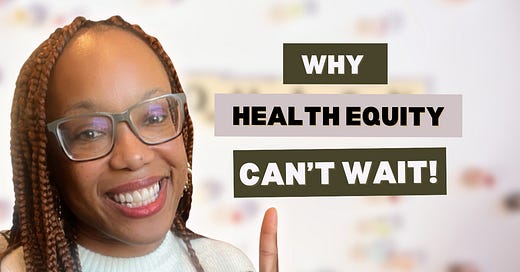Why Health Equity Can’t Wait
The warning signs we’re missing and what that means for Black women's health.
One of the strange blessings of my parents' divorce was the opportunity to grow up living in my grandparents' home. From fishing for catfish with my grandfather to baking cakes with my grandmother, I carry many beautiful memories of those years. But growing up with my grandparents also meant witnessing their health decline. One of my most painful memories happened during my teenage years.
I came home from high school to find my grandmother sitting on our front steps, her knees scraped and bleeding from a fall. My grandfather, already in a nursing home, wasn't there to help her. I didn't know how long she'd been outside before I found her. My only thought at the time was to clean her wounds. I never asked her what happened.
Months later, she suffered a stroke. That's when I learned her fall wasn't just an accident but an early warning sign I had overlooked. This experience has stayed with me, shaping my understanding of the vital role of health equity and social justice in our communities.
My grandmother's fall was more than just a personal story—it's a glimpse into the systemic issues Black women face when it comes to healthcare. Community health education, or the lack thereof, plays a critical role. The systems that should have equipped me—a teenager in a community already experiencing disparities—with the knowledge to recognize the warning signs of a stroke failed us. And that failure reflects a broader inequity: health education is often inaccessible to the communities that need it most.
For Black women, this lack of education compounds other inequities, such as disparities in healthcare access, quality, and outcomes. If we remain inactive in addressing these issues, the consequences will be devastating. But where do we start?
Three Steps Toward Health Equity for Black Women
While there's no single solution to dismantling systemic health inequities, there are three actionable areas we can focus on:
1. Know the Warning Signs
Black women disproportionately face chronic conditions like hypertension, diabetes, and heart disease. Yet many—my younger self included—don't know the early warning signs of these conditions. This lack of knowledge delays treatment, sometimes until it's too late. For instance, strokes often present subtle signs that, when caught early, can save lives. However, education on recognizing these signs is rarely prioritized in communities of color.
As healthcare providers, you can:
Proactively educate your Black patients about the early signs of chronic conditions.
Advocate for health literacy programs in schools and communities.
Partner with community organizations to disseminate this critical information.
2. Ensure Equitable Access and Quality Care
Access to quality healthcare should not depend on income, insurance type, or zip code. Yet Black women often report feeling dismissed during medical visits—a dismissal rooted in systemic biases that worsen health outcomes. In my family's case, I saw firsthand how differences in insurance coverage influenced care. My grandmother's Medicare plan didn't offer the same level of access and quality as the private insurance my mother and I had.
As providers, you can:
Screen your systems for implicit biases and inequities in care delivery.
Collaborate with policymakers to expand access to affordable, quality care.
Amplify the voices of patients who experience dismissive or subpar care.
3. Vote for Policymakers Who Value Health Equity
Healthcare inequities are rooted in policy decisions. Elected officials at every level—from local councils to the federal government—make decisions that shape access to care, funding for health programs, and enforcement of anti-discrimination laws. Living in Massachusetts, I've seen the difference proactive policies can make. However, not everyone lives in a state prioritizing health equity. The good news? We can change that by voting for leaders committed to dismantling systemic barriers and ensuring equitable care.
As healthcare providers and advocates, you can:
Educate your communities about how policy impacts health equity.
Mobilize voters to participate in elections beyond the presidency.
Support candidates with track records of prioritizing health equity.
I can't rewrite the past. My grandmother's stroke and the events leading up to it will always serve as a painful reminder of what happens when systems fail Black women. But I can work toward a future where stories like hers are the exception, not the rule.
This vision requires action—yours, mine, and ours. We can educate communities, advocate for equitable care, and hold policymakers accountable. If you're ready to join this mission, I invite you to take the first step: subscribe to the EBWH Community Newsletter.
Let's transform healthcare systems one action at a time.
With gratitude and hope,
Tomesha





